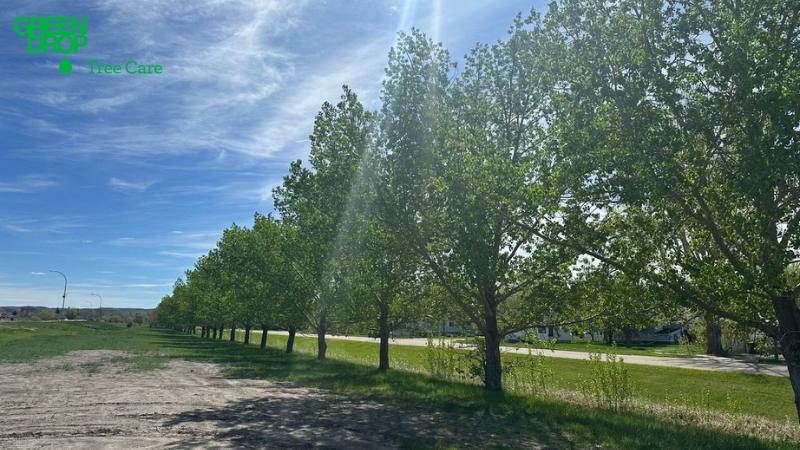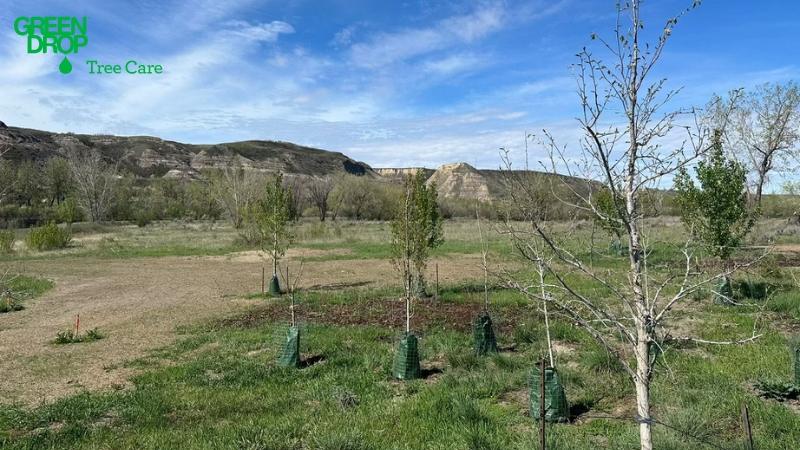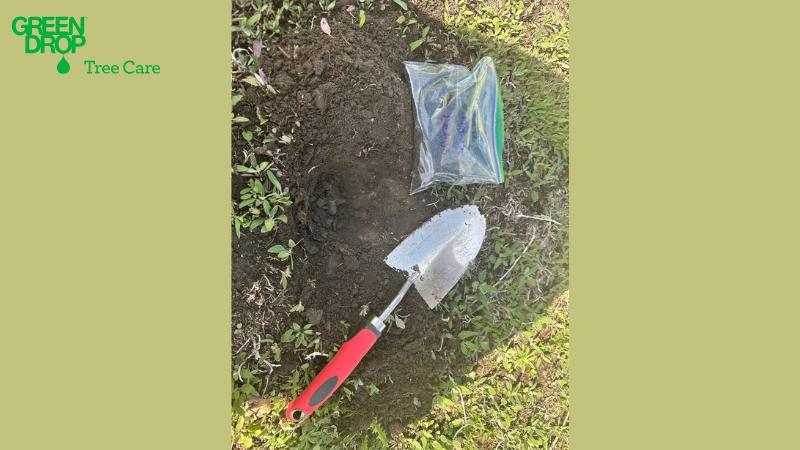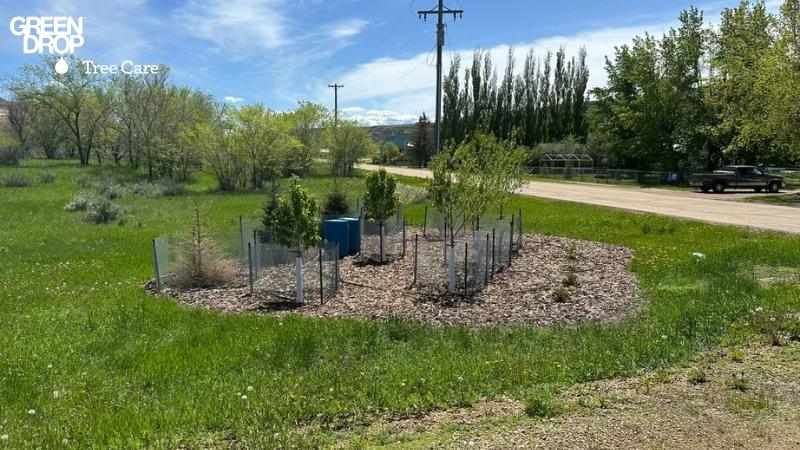Urban Forestry in Drumheller: Cultivating Green Horizons with Green Drop

A case study on climate-resilient tree planning, public consultation, and GIS-driven urban forest management in Alberta’s Badlands.
Snapshot Overview
- Location: Drumheller, Alberta
- Timeline: February 2024 – Spring 2025
- Landscape context: Badlands, dry climate, sandy soils, wildlife pressure
- Urban Forestry challenge: Balancing flood mitigation with long-term canopy restoration
- Green Drop’s role: Develop an urban forest plan rooted in ecological data, resident input, and scalable management
Client Profile: The Town of Drumheller
The Town of Drumheller is a unique municipality in southern Alberta, home to just under 8,000 residents and internationally known for its dramatic Badlands terrain and rich paleontological history.
The Problem: A Flood Solution That Required Tree Removal
Known for its rich history and striking canyons, it’s also a community shaped by water, specifically, the ongoing challenge of flood management.
Over the past century, Drumheller has experienced multiple severe floods, prompting long-term infrastructure investments to protect homes, businesses, and public spaces.
But progress comes with trade-offs. As part of major flood mitigation works (including berm and dike construction) many trees along key corridors had to be removed. Recognizing the ecological and social value of its urban canopy, the Town committed to a forward-thinking goal: a 5:1 replacement ratio for every healthy tree removed.
Some other challenges included:
- Poor soil structure (sandy, low nutrient-holding capacity)
- Limited rainfall, with occasional drought conditions
- Wildlife interference, particularly from deer and beavers
- Limited local arboricultural capacity
- Budget constraints that required scalable, efficient planning
In early 2024, the Town of Drumheller partnered with Green Drop’s Urban Forestry Division to develop a comprehensive tree replanting and management plan.
“Urban forestry in a place like Drumheller isn’t about planting trees for the sake of greenery—it’s about resilience. With sandy soils, drought, wildlife pressure, and major infrastructure works all in play, we had to build a plan rooted in data, local context, and long-term thinking. What made this project so rewarding was how the Town leaned into both science and community values. That 5:1 replacement goal wasn’t just ambitious; it was meaningful. It set the tone for a greener, smarter future, and we’re proud to have helped lay the groundwork.”
— Mike Leung, Arborist, Green Drop Urban Forestry Division

The Solution: Step-by-Step Plan On How We Built a Resilient Urban Forest for Drumheller
To address Drumheller’s unique urban forestry challenges, we developed a multi-phase, science-backed strategy designed for long-term success and community engagement.
Desktop Assessment
We began with a thorough desktop review, analyzing previous planting plans and specifications, historical climate data for precipitation, wind, and drought frequency, soil and ecological reports and scientific literature on regional tree performance and stress tolerance.
This provided a macro-level understanding of local conditions, helped identify patterns of past planting failure, and framed the criteria for species selection and site prioritization.
Field Assessment
Next, we conducted on-the-ground evaluations to ground-truth our findings. These included:
- Soil testing across multiple locations were conducted to determine soil texture, structure, nutrient availability, and water-holding capacity. Testing was conducted through Green Drop’s in-house Plant Disease Diagnostic Laboratory.

- Tree composition surveys to assess existing species’ health, diversity, and performance
- Environmental and ecological review to document site-specific exposure (sun, wind), slope, nearby watercourses, and wildlife pressure.
- Pest/disease inspections to map visible threats like canker, root rot, insect infestation, etc.
GIS Mapping and Data Integration
All collected data was digitized into a central ArcGIS-based mapping platform. This allowed us to:
- Visualize existing canopy cover and species distribution
- Identify high-risk and high-potential planting sites
- Overlay flood-prone areas and berm construction zones
- Track soil conditions, tree health, and wildlife exposure
This centralized system served as the foundation for both our internal planning and the town’s public engagement and maintenance program.
Public Engagement
Using Survey123 tools, Green Drop facilitated a digital-first public engagement process to gather input on:
- Preferred planting areas
- Concerns about maintenance or tree survival
- Interest in participating in care and stewardship
- Feedback on species preferences and local planting priorities
This ensured the final plan wasn’t just technically sound, it was informed by the people who live with and care for these trees.
Planting Plans and Species Recommendations
We developed detailed planting plans for multiple priority zones across Drumheller. Each plan outlined:
- Recommended species tailored to site conditions (soil, exposure, wildlife pressure)
- Diversity goals to minimise monoculture and maximise ecological resilience
- Spacing, maintenance zones, and staging to support long-term success
Where possible, we prioritised native or locally adapted species with strong drought tolerance, pest resistance, and proven performance in similar Alberta environments.

Urban Forest Implementation Plan (UFIMP)
All findings, strategies, and maps were compiled into a comprehensive Urban Forest Implementation Plan. This document included:
- Species-by-site matrices
- Maintenance and watering guidelines
- Risk and condition rankings of existing trees
- Future planting schedules and budget projections
- Canopy development forecasts based on i-Tree modelling
This UFIMP is now serving as a long-term guide for the town’s urban greening strategy.
Council Presentation
In Spring 2024, Green Drop presented the UFIMP to Drumheller Town Council. Clear visuals—like canopy gap and flood-overlay maps—helped secure support across departments. The Council appreciated how planting aligned with infrastructure plans and future biodiversity goals.
Watch the council presentation here (14:00–44:00)
Training Local Teams for Long-Term Success
Town staff received practical training on:
- Tree planting, staking, and pruning
- Pest and soil health monitoring
- Using ArcGIS Field Maps and Survey123 for tracking and updates
Safety & Team Management
With rugged terrain and overlapping field teams, safety was paramount. Each site had a custom risk assessment, daily briefings, and GIS-flagged hazard zones to guide adaptive strategies in the field.
Results
By spring 2025, the Town of Drumheller not only had a fully developed Urban Forest Implementation Plan (UFIMP) but also a clear roadmap for rebuilding and expanding its canopy in a sustainable, strategic, and community-supported way.
Key deliverables included:
- Digital Tree Inventory integrated into ArcGIS for long-term tracking and updates
- Site-specific planting matrix aligned with soil, climate, and wildlife factors
- Lab-tested soil health profiles to guide amendments and species success
- Tree maintenance manual covering pest protocols, pruning, and watering
- Public engagement framework using Survey123 to gather ongoing feedback
- Budget forecasts tied to planting phases and seasonal execution windows
Our Consulting Arborists
Mike Leung: Project Manager
Education and Certifications:
- ASCA Registered Consulting Arborist
- ISA Board Certified Master Arborist
- ISA Urban Forestry Specialist
- ISA Tree Risk Assessor
- Post-graduate Certificate in Arboriculture, Melbourne University
- B.Sc. in Environmental Science, The Chinese University of Hong Kong
- Manitoba Pesticide Applicator’s Licence
- IPM Certified Pesticide Applicator
Matt Vinet: Lead Urban Forest Consultant
Education and Certifications:
- ISA Certified Arborist
- ISA Tree Risk Assessment Qualification
- Journeyman Landscape Technician
- IPM Certified Pesticide Applicator
Jon Marker: Ecologist
Education and Certifications:
- B.Sc. Biological Sciences – Integrative Physiology and the Environment (University Of Manitoba)
- ISA Certified Arborist
- Manitoba Pesticide Applicator’s license
Conclusion
The Town of Drumheller’s commitment to replacing lost trees with five times as many was a statement. A statement that urban forests matter, even in challenging environments. That sustainability, ecology, and infrastructure can, and should, go hand in hand.
Looking to rebuild your urban canopy the right way?
Let’s talk about how we can help your municipality build climate resilience, engage your community, and grow a greener future with our urban forestry solutions.
Contact our urban forestry team to get started.
Are your arborists certified and insured?
Are your arborists local to each service area?
Do I have to be a Green Drop customer to use the lab?
Do I need a permit to plant a tree?
Do you diagnose and treat tree diseases?
Do you offer both residential and commercial tree care?
Do you offer the same services in every city you operate in?
Do you provide free estimates?
Explore Our Latest Insights


5 Signs Your Tree Is in Trouble (And What to Do About It)
